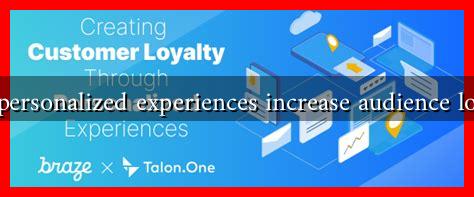-
Table of Contents
Can Personalized Experiences Increase Audience Loyalty?
In today’s fast-paced digital landscape, businesses are constantly seeking ways to engage their audiences and foster loyalty. One of the most effective strategies that has emerged is the personalization of customer experiences. By tailoring interactions to meet individual preferences and needs, brands can create deeper connections with their audiences. This article explores how personalized experiences can significantly enhance audience loyalty, supported by relevant examples, case studies, and statistics.
The Importance of Personalization
Personalization refers to the practice of customizing a product or service to meet the specific needs of individual customers. This approach has gained traction due to the increasing expectations of consumers for tailored experiences. According to a study by Epsilon, 80% of consumers are more likely to make a purchase when brands offer personalized experiences. This statistic underscores the importance of personalization in driving customer engagement and loyalty.
How Personalization Builds Loyalty
Personalized experiences can foster loyalty in several ways:
- Enhanced Customer Satisfaction: When customers feel that a brand understands their preferences, they are more likely to be satisfied with their interactions. For instance, Netflix uses sophisticated algorithms to recommend shows and movies based on users’ viewing history, leading to higher satisfaction rates.
- Increased Engagement: Personalized content can lead to higher engagement rates. Email marketing campaigns that utilize personalization have been shown to achieve 29% higher open rates and 41% higher click-through rates, according to Mailchimp.
- Stronger Emotional Connections: Personalization can create emotional bonds between brands and customers. For example, Coca-Cola’s “Share a Coke” campaign, which featured personalized bottles with names, resulted in a 2% increase in sales and a significant boost in brand loyalty.
Case Studies of Successful Personalization
Several companies have successfully implemented personalized experiences to enhance audience loyalty:
- Amazon: Amazon’s recommendation engine is a prime example of effective personalization. By analyzing customer behavior and purchase history, Amazon suggests products that align with individual preferences, resulting in increased sales and customer retention.
- Spotify: Spotify’s “Discover Weekly” playlist curates music recommendations based on users’ listening habits. This personalized approach not only keeps users engaged but also encourages them to explore new music, enhancing their overall experience with the platform.
- Sephora: Sephora’s Beauty Insider program offers personalized product recommendations and rewards based on customer preferences and purchase history. This strategy has led to a loyal customer base that feels valued and understood.
Challenges of Implementing Personalization
While the benefits of personalization are clear, businesses must also navigate several challenges:
- Data Privacy Concerns: With increasing scrutiny on data privacy, companies must ensure they handle customer data responsibly. Transparency about data usage can help build trust.
- Resource Intensive: Developing personalized experiences requires significant investment in technology and data analytics. Small businesses may find it challenging to implement such strategies effectively.
- Over-Personalization: Striking the right balance is crucial. Overly personalized experiences can feel intrusive and may alienate customers.
Conclusion
In conclusion, personalized experiences have the potential to significantly increase audience loyalty by enhancing customer satisfaction, engagement, and emotional connections. Companies like Amazon, Spotify, and Sephora demonstrate the effectiveness of personalization in building lasting relationships with customers. However, businesses must also be mindful of the challenges associated with implementing personalized strategies, particularly regarding data privacy and resource allocation. By navigating these challenges and focusing on creating meaningful, tailored experiences, brands can cultivate a loyal audience that not only returns but also advocates for their products and services.
For further insights on personalization strategies, you can explore resources from Forbes.


